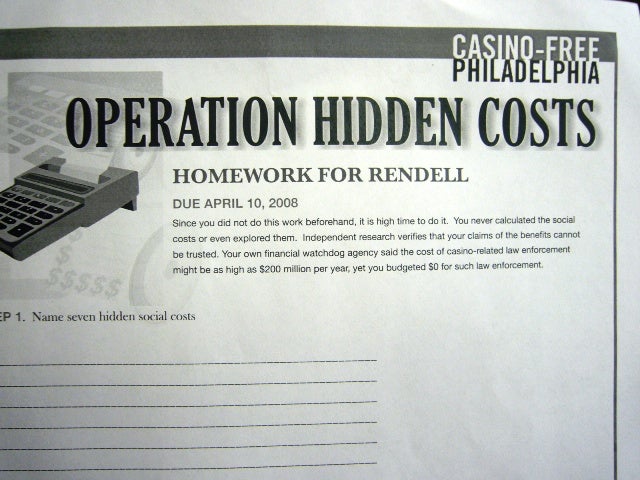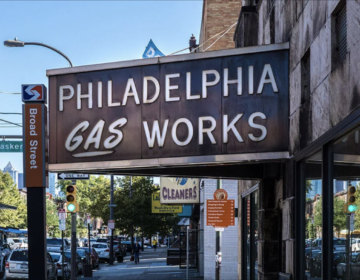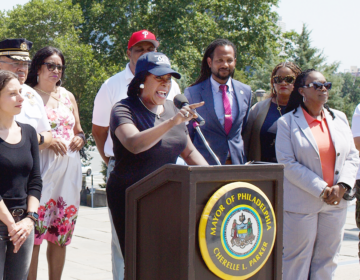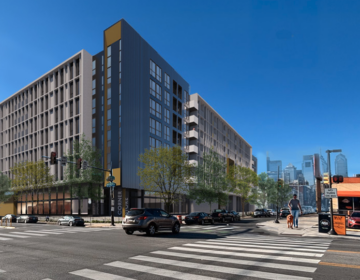Activists: Casinos carry hidden costs

March 12
By Natalie Pompilio and Thomas J. Walsh
For PlanPhilly
Gov. Ed Rendell and those who support building slots casinos along the Philadelphia waterfront point to the millions in tax revenues and thousands of jobs the gambling parlors could bring. A boon to the city, they say, one that offsets possible problems like traffic congestion and neighbor complaints.
But what about the money the city will have to spend on policing the areas? On helping those who develop gambling problems? How will the city handle losing shipping business when companies find other port areas are less congested? What will happen to residents who find their homes devalued?
Those are some of the less obvious effects casinos will have, according to the nonprofit activist group Casino-Free Philadelphia. As part of “Operation Hidden Costs,” the anti-casino organization held a meet and greet Tuesday night at its N. 2nd Street headquarters, offering a panel of people who said there was more at stake than many people realize.
Driving the push for the casinos is “the cult of taxation,” said LaSalle University economics professor David George. Politicians “see the casino as a voluntary payment of taxes.”
A local realtor described how at least 15 people called and asked about putting their houses for sale on the day the South Philadelphia site was unveiled. One of her customers, who was moving to the city to work with new Mayor Michael Nutter, seemed to balk at a Pennsport/Queen Village home after learning Foxwoods would be nearby.
“I don’t know if he didn’t want it in his backyard but it’s in all of our backyards,” Realtor Kathy Conway said.
“Front yards!” a woman in the crowd shouted.
Therapist Tina DiSanto offered chilling statistics showing addiction rates for gambling doubles when a gambling venue is within 35 to 50 miles away and that such an addiction leads to an increase in criminal behavior, homelessness, child abuse and divorce. The state was “grossly underestimating as to the severity of addiction and consequences,” she said. “It’s a hidden disease. It’s quiet. … The social cost could be $200 to $400 million or more.”
Joe, a self-proclaimed gambling addict, told his own story of struggle. Never tempted to travel hours to Atlantic City, he found himself drawn to casinos when Harrah’s opened within a 15-minute drive from his home. A widower, he was depressed and looking for something to do.
“Two lights in Chester, I’m there,” he said. “I started going on Fridays. I started going on Saturdays. I started going on Sundays.
Within a year, Joe said, he’d lost $130,000, tapped into his retirement savings, and his house was at risk. He considered suicide before getting into therapy.
“What people like me think of as a solution becomes the problem,” he said. People who have easy access are the ones who it’s going to kill.”
The governor’s budget allows little extra money for policing or treating gambling addicts, said Daniel Hunter, co-founder of Casino-Free Philadelphia. This, even though one independent study group estimated at least $2.3 million was needed for addiction services and a financial watchdog agency estimated casino-related law enforcement could run as high as $200 million a year.
“You now have better numbers than Rendell on a lot of these points,” Hunter told the crowd of about 30 people.
To that end, the group sent the Governor a worksheet labeled, “Homework for Rendell … Due April 10, 2008.” His assignment: To name seven hidden social costs of casino construction, produce a cost/benefit analysis, and prepare for a debate against representatives from the non-profit.
The Rendell administration said it’s already done the assignment and came up with a different answer than the activists.
In a phone interview Wednesday morning, Gov. spokesman Chuck Ardo said that he would tell all casino opponents that there already was a debate on the casino issue in Harrisburg. “I would recommend they go to the library and read the extensive coverage of the debate,” he said when asked about Casino-Free’s proposal. Asked if that meant Casino-Free was out of luck, he said, “You’ve got my answer.
Tuesday night, Hunter told the gathering that a Rendell spokesman had a standard response to the group’s requests: “We believe that most people gamble responsibly and the money allotted is sufficient.”
The answer drew laughs and sighs from the audience – which seemed, like the panel, not to include a single person who wants slots on the Delaware River.
Casino-Free isn’t the only group advising officials to reexamine the cost/benefits of the casinos. At a daylong meeting of City Council’s Rules Committee on Monday that mostly dealt with Foxwoods’ traffic issues, the issue of that casino’s economic impact was addressed by Terry Gillen, senior advisor to Mayor Nutter and a longtime city economic development specialist. She encouraged Council to consider updating a 2004 gaming impact study to reflect new data on casino revenues after “the novelty wears off.” In 2004, there were no casinos in Pennsylvania, she said, but now there are established slots parlors to examine.
“How we do it matters,” Gillen said, adding that the idea of an update is “to augment rather than detract.” With casino revenues, she said, it is important not to mix up the existing consumer dollars spent on retail in the Columbus Boulevard area with hypothetical new dollars coming in because of the casino alone.
Stephen Mullin, a former city commerce director hired by Foxwoods to undertake a financial impact study, said at the hearing that most casino revenue would come from gamblers outside the city, or from money that locals now spend in Atlantic City or other gambling towns. That was also the conclusion of an earlier study by the Philadelphia Casino Advisory Task Force.
Mullin’s Monday statements were criticized by members of Tuesday night’s panel. Jim Paylor, vice president of the International Longshoremen’s Association, said Mullin provided “shallow statements about the economic benefits” of the casinos. For more on Operation Hidden Costs, go to www.casinofreephila.org
Contact the reporter at npompilio@hotmail.com.
WHYY is your source for fact-based, in-depth journalism and information. As a nonprofit organization, we rely on financial support from readers like you. Please give today.






